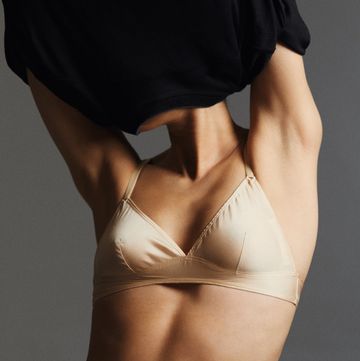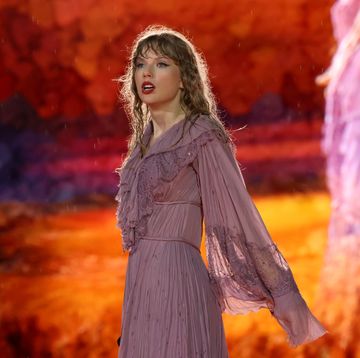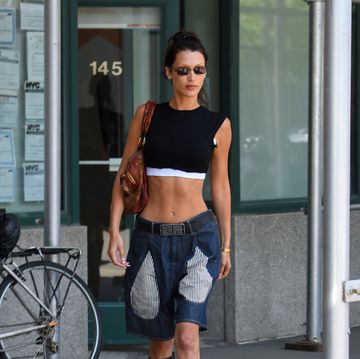Before anything else, I know the reaction is going to be one of intense awkwardness. It’s not unusual to be at a fashion dinner or PR event and for the subject of Ozempic to come up. It’ll be someone who’s barely a size 10 proudly announcing that they’ve just started taking the drug, which is prescribed to treat type-2 diabetes but has more recently been appropriated as a weight loss wonder cure.
At first, people are excited to hear about it: everyone will ask how it is and think it’s really cool, until I speak up and say, ‘Here’s an actual fat person — not fat as in me not liking myself, but clinically obese — taking Ozempic because my PCOS means I’m struggling to lose weight and I don’t want to become pre-diabetic. I’m the type of person that this drug is for.’ That’s usually when the awkwardness hits.
Despite this, and the embarrassed apologies that follow, I choose to speak up: it’s a touchy subject for me but also one I’m passionate about. As a size 22 woman, who needs the drug for health reasons, it makes me so angry hearing about someone who’s a size 10 taking it very blatantly because they want to eat freely and not gain any weight. Or models (yes, there are plenty of models on Ozempic) who are using it to make sure they keep getting booked for jobs. These are also the people who, when it comes to size, the world, and in particular the fashion industry, already caters to.
For the past five months, I’ve been injecting Ozempic into my thighs or the back of my arms every week. A lot of people inject directly into their stomach for a quick fix, but this comes with a lot of side effects like bruising and stomach ulcers; no one talks much about those. The reason I’m on Ozempic is because I was suffering from symptoms related to PCOS: I’d been more rundown than usual, with terrible period pains and was struggling to exercise.
I went to the doctor who told me my bloods were all fine but recommended I try Ozempic. I did my research into the drug before I started taking it and worked closely with my GP about how to manage possible side effects, such as heart palpitations. Since I’ve been on Ozempic though, my symptoms have calmed down. I’ve also been losing weight but it's coming off quite slowly, three or four pounds, rather than a stone in a week which can happen when some people take it.
But what’s become clear for me during this time is that there is an Ozempic pandemic in the fashion industry. When the articles started to come out about the drug, it was easy to think it was an American problem, but it was already widespread in fashion here. I'd encounter a PR mentioning it one day, a stylist or photographer the next. The world is talking about it. And everyone in my work world seems to be taking it. I find this particularly unsettling because there are not many people in fashion who look like me.
I understand that body dysmorphia is a real thing and I’m not shaming it at all. But I am bigger than other people. Physically, I take up space. I’ve heard people insult me during fashion week. (I don’t understand much French but I know when someone is being rude.) And I’m constantly complaining about show season seating, which is often so small and so crowded that nobody (regardless of what dress size you wear) is able to sit on them.
I don’t have the desired plus-size look – in fashion we're just picking slightly thicker people than we were before, or shoehorning women who are a size 10 into being plus-size because everyone else has got to be a size zero. Everything I wear at events and shows are clothes that I've had custom made, even though there are sales figures that show there’s big business in this corner of the market. Every day of my working life makes me feel othered and a little bit weird. So having Ozempic come along, and witnessing people embrace this thing that is technically not for them is quite wild.
It also makes it far harder to get hold of the drug, which has become increasingly more expensive too. In the six month’s I’ve been on Ozempic, the problem has only become worse; I’ve had to change the way I use it, sometimes injecting two pens at a time to increase my dosage rather than being able to get one pen with the correct dosage, because it’s becoming more and more scarce. I now dread it running out and having to search the internet to find more. So I've resorted to having to buy it in bulk.
But fashion’s obsession with Ozempic is symptomatic of a much bigger issue when it comes to body positivity and diversity. We may have moved the needle slightly but it’s really only the same three models we see representing body diversity over and over again. I think before people wanted to hear about improving inclusivity, and now they find it annoying and awkward because they think the problem has been fixed. But the issue is not going to go away if we won't have real conversations about it. We can't champion body positivity, and inject ourselves with Ozempic behind closed doors.
I'm aware that if I take the medication and lose as much weight as I'm supposed to, I'm going to be on it for a really long time. Because the moment you stop taking it, you put on more weight. It's not a quick fix for me which is why I’ll continue to speak up about the plus size issue: I can’t let another girl who looks like me come into this industry and go through what I’ve been through.
I do think it is fixable but we all need to work together to create more imagery that isn’t just one-sided, so it feels like there are people who don’t all look the same way existing in a fashion space. You never know, a side effect might be curing the industry of its Ozempic obsession.
This feature was initially published in the October 2023 issue of ELLE magazine.













